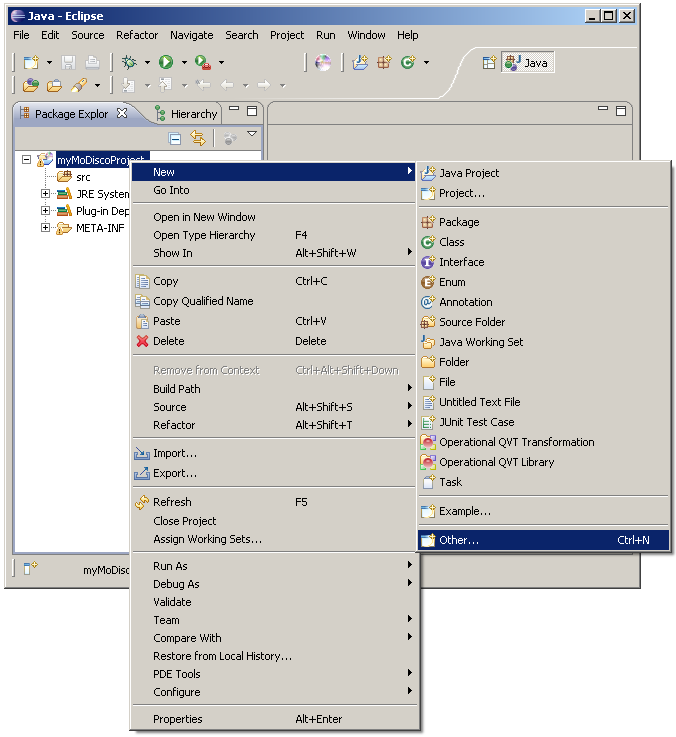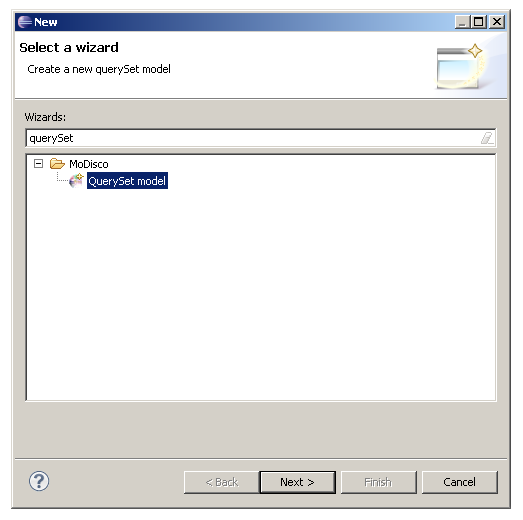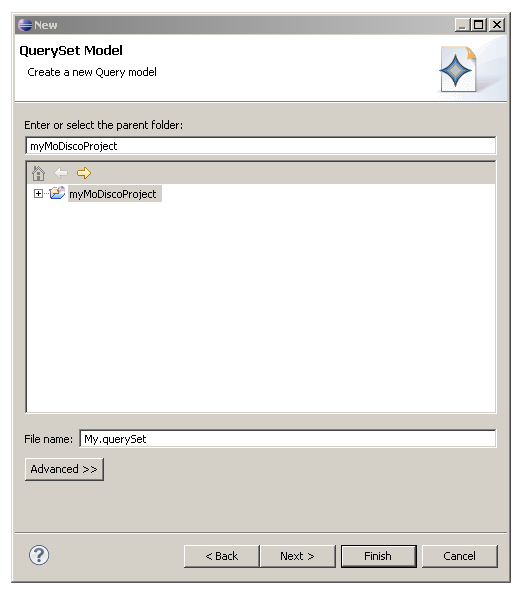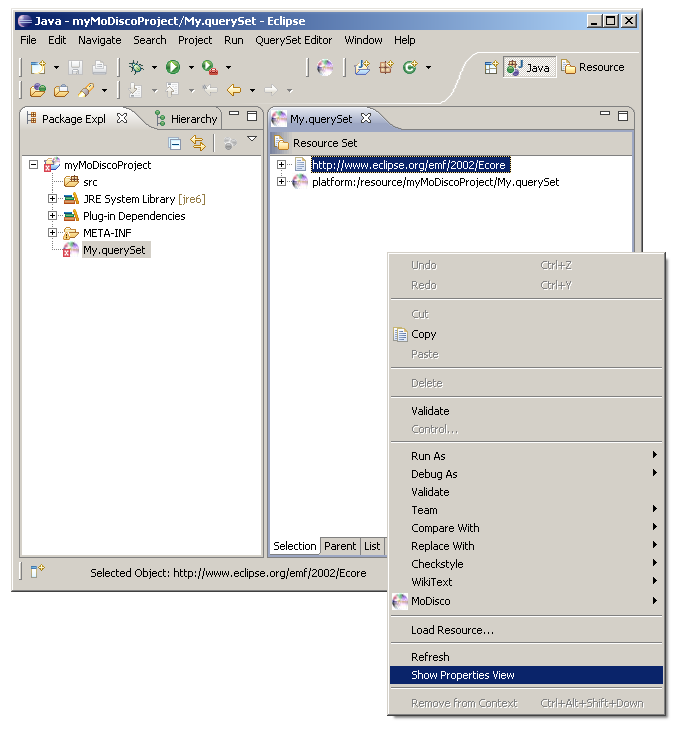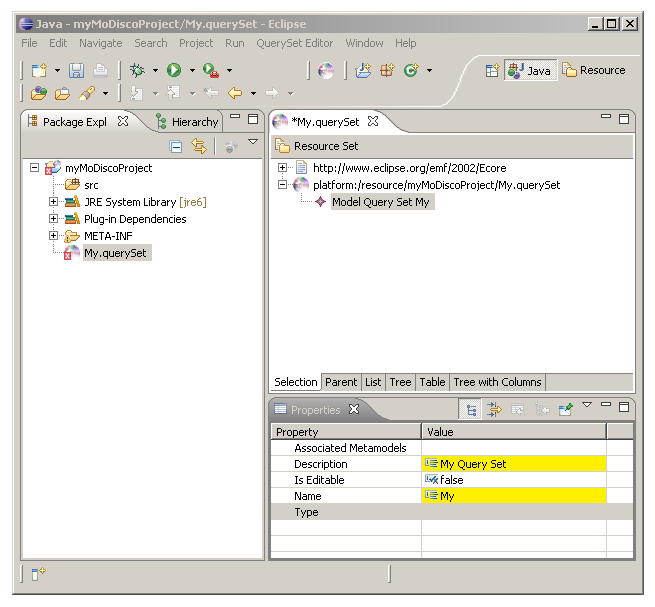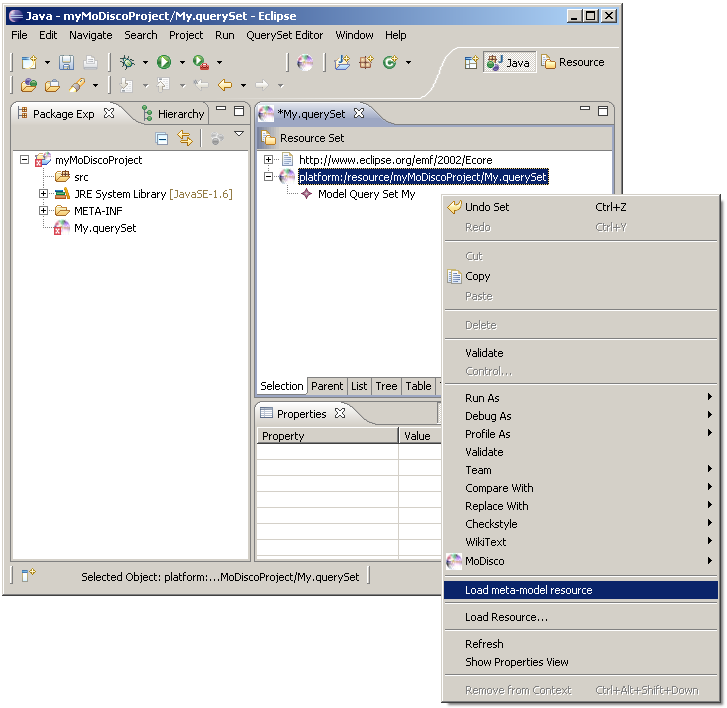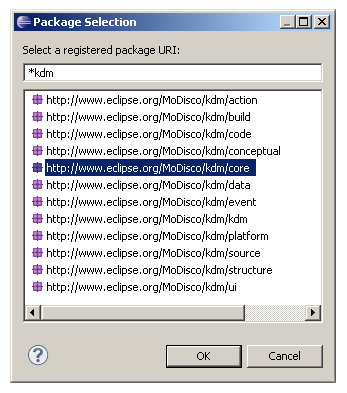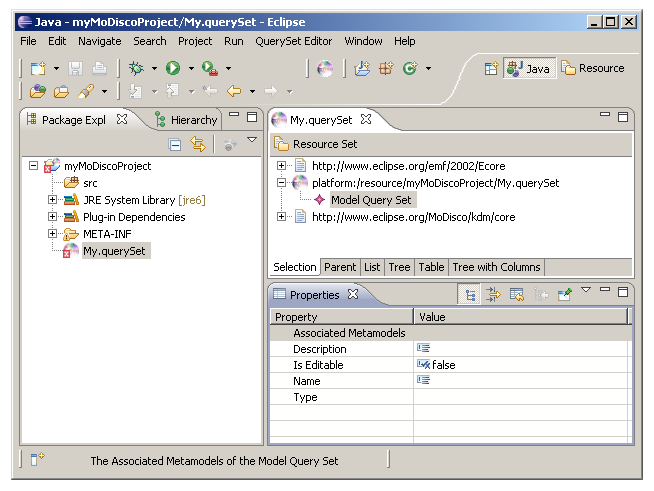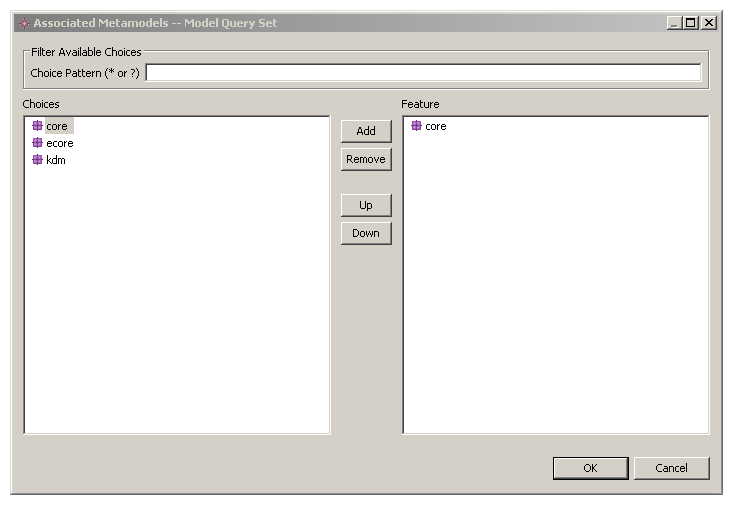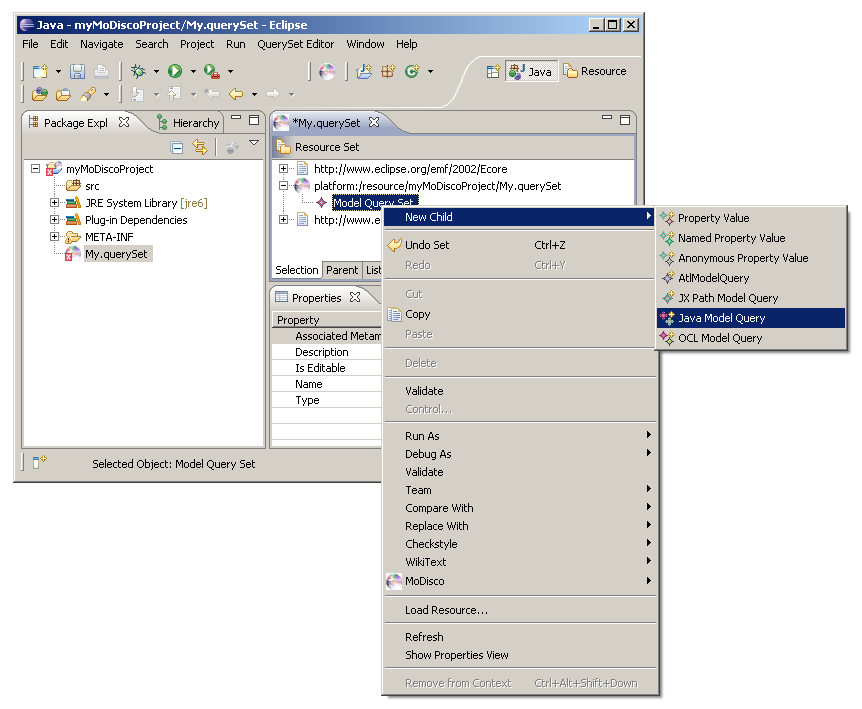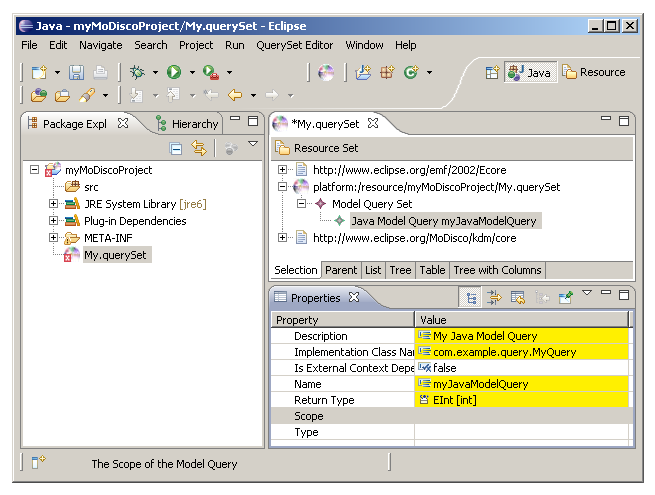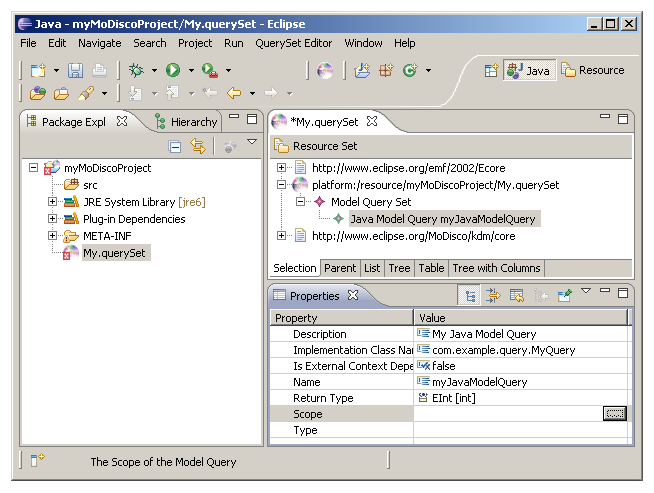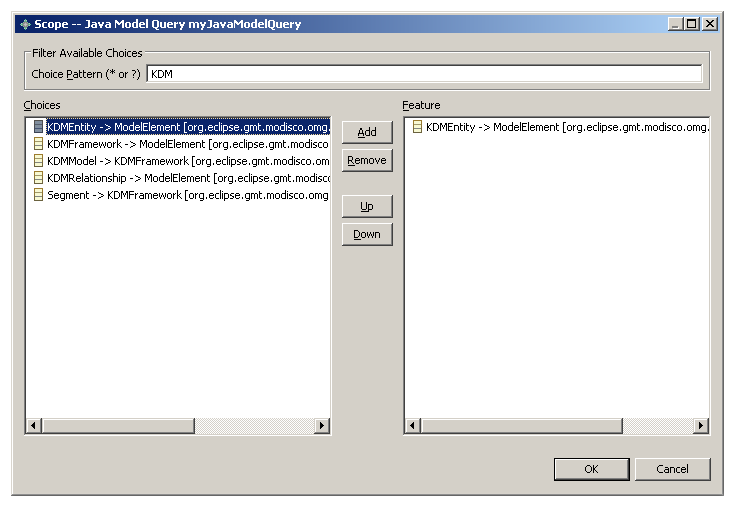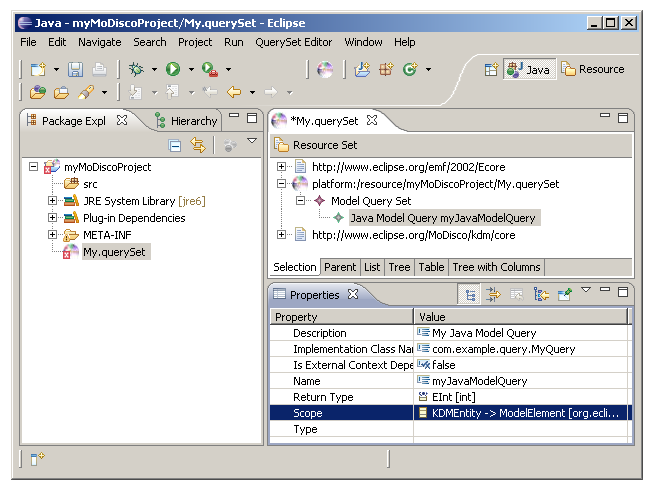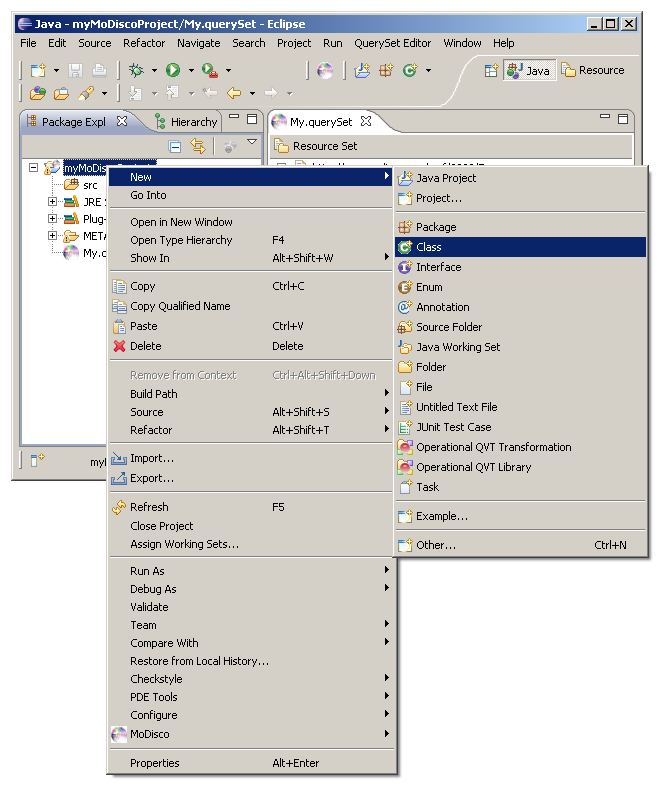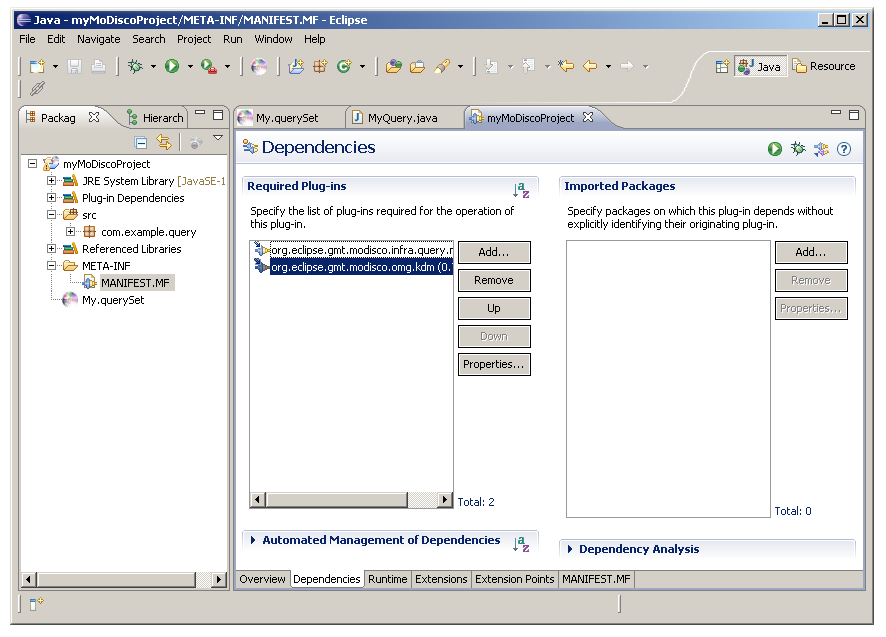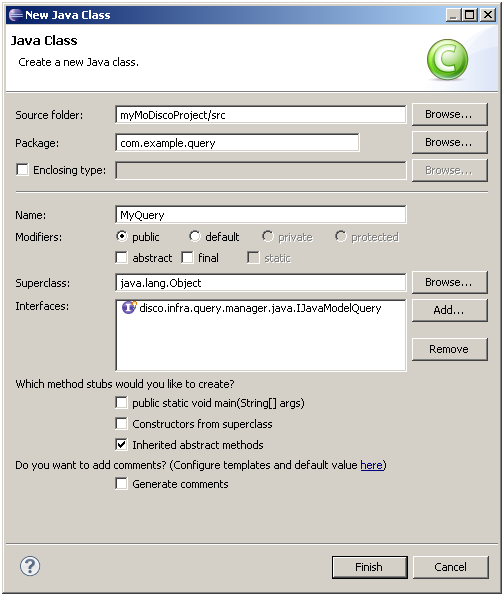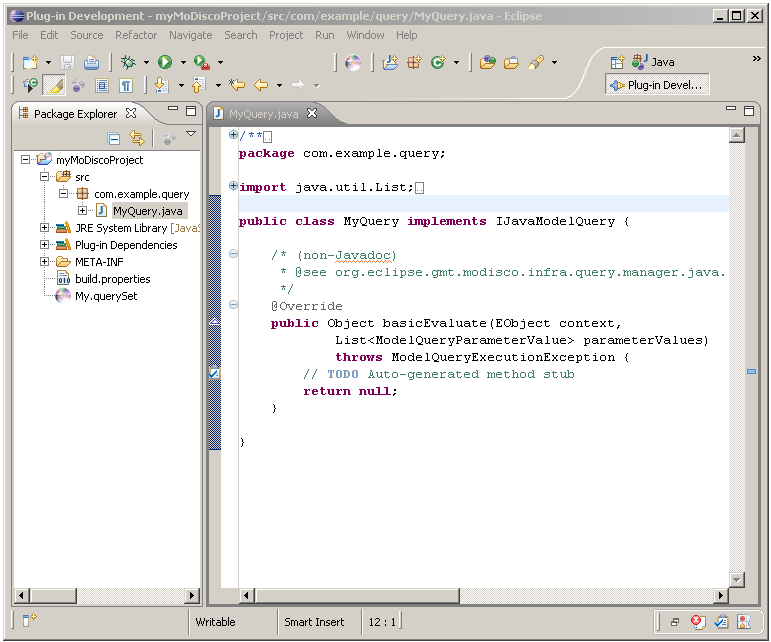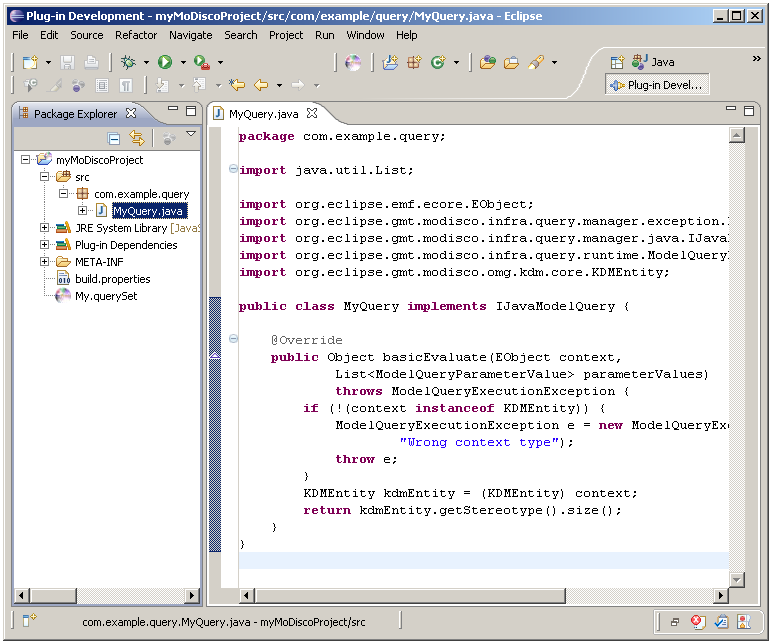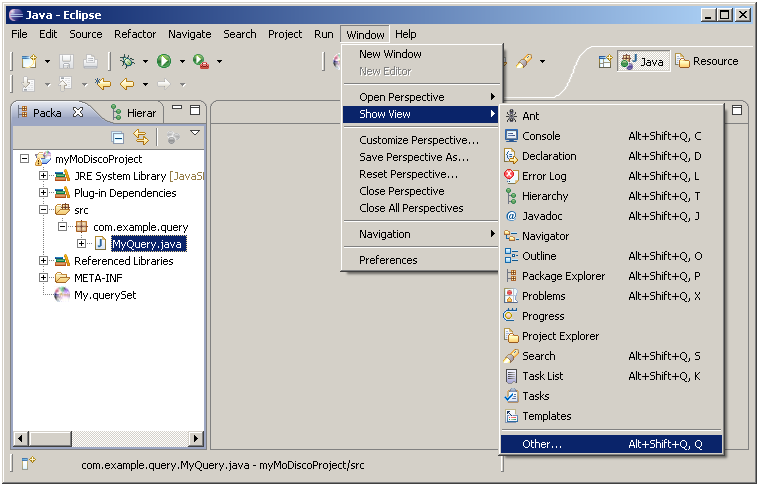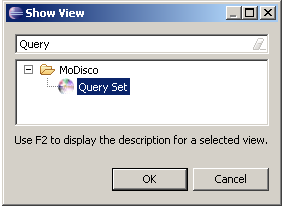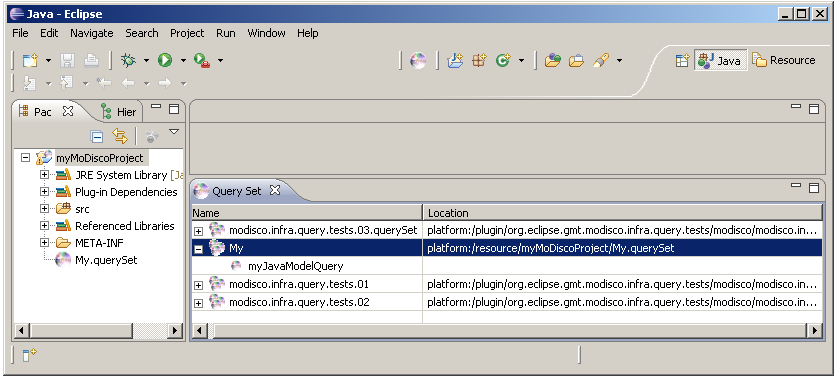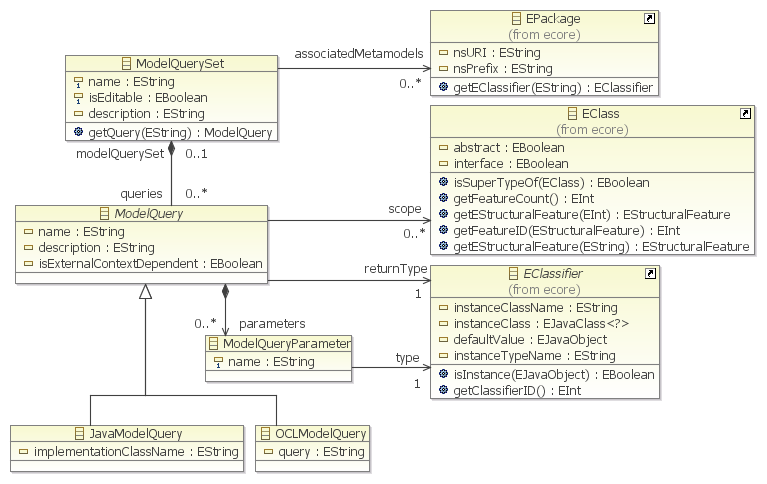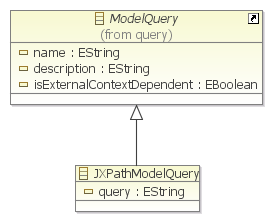Notice: this Wiki will be going read only early in 2024 and edits will no longer be possible. Please see: https://gitlab.eclipse.org/eclipsefdn/helpdesk/-/wikis/Wiki-shutdown-plan for the plan.
Difference between revisions of "MoDisco/Components/QueryManager/Documentation/0.8"
(Remove introduction (already exists in MoDisco/QueryManager/Presentation)) |
(minor corrections) |
||
| (3 intermediate revisions by the same user not shown) | |||
| Line 5: | Line 5: | ||
Right-click on the MoDisco project and select the "New > Other ..." button. | Right-click on the MoDisco project and select the "New > Other ..." button. | ||
| − | |||
| − | |||
[[Image:NewModelQuerySet 001.png]] | [[Image:NewModelQuerySet 001.png]] | ||
| − | Select " | + | Select "QuerySet Model" and press the "Next" button |
[[Image:MoDisco_Query_newModelQuerySet_002.png]] | [[Image:MoDisco_Query_newModelQuerySet_002.png]] | ||
| Line 24: | Line 22: | ||
Set the description of the query set and take care that the query | Set the description of the query set and take care that the query | ||
| − | set name is the same | + | set name is the same as the containing file name ("My" in the |
example). | example). | ||
| Line 31: | Line 29: | ||
Load the resources containing the meta-models used by the model | Load the resources containing the meta-models used by the model | ||
queries that will be owned by the query set. To load a meta-model | queries that will be owned by the query set. To load a meta-model | ||
| − | resource | + | resource use the "Load meta-model resource" action. |
[[Image:MoDisco_Query_newModelQuerySet_008.png]] | [[Image:MoDisco_Query_newModelQuerySet_008.png]] | ||
| Line 49: | Line 47: | ||
[[Image:MoDisco_Query_newModelQuerySet_011.png]] | [[Image:MoDisco_Query_newModelQuerySet_011.png]] | ||
| − | Right click on the ModelQuerySet element and choose the "New > | + | Right click on the ModelQuerySet element and choose the "New Child > |
Java Model Query" action to create a "Java Model Query". | Java Model Query" action to create a "Java Model Query". | ||
| Line 60: | Line 58: | ||
[[Image:MoDisco_Query_newModelQuerySet_013.png]] | [[Image:MoDisco_Query_newModelQuerySet_013.png]] | ||
| − | Fill the "Scope" field with meta-class | + | Fill the "Scope" field with the meta-class to which the query will be |
applicable. | applicable. | ||
| Line 73: | Line 71: | ||
A MoDisco project is also a "Plug-in project". To be able to | A MoDisco project is also a "Plug-in project". To be able to | ||
refer to the API of the used meta-model, we have to add the "org.eclipse.gmt.modisco.infra.query.core" plug-in and the meta-model | refer to the API of the used meta-model, we have to add the "org.eclipse.gmt.modisco.infra.query.core" plug-in and the meta-model | ||
| − | implementation plug-in in the plug-in | + | implementation plug-in in the plug-in dependencies. |
[[Image:MoDisco_Query_newModelQuerySet_020_1.png]] | [[Image:MoDisco_Query_newModelQuerySet_020_1.png]] | ||
| − | Java Query implementation class must implement | + | The Java Query implementation class must implement |
org.eclipse.gmt.modisco.query.core.java.IJavaModelQuery. | org.eclipse.gmt.modisco.query.core.java.IJavaModelQuery. | ||
| Line 84: | Line 82: | ||
[[Image:MoDisco_Query_newModelQuerySet_021.png]] | [[Image:MoDisco_Query_newModelQuerySet_021.png]] | ||
| − | ==How to consult the MoDisco query set catalog | + | ==How to consult the MoDisco query set catalog through the UI== |
If a query set model is valid, it is registered in the model | If a query set model is valid, it is registered in the model | ||
query set catalog. To consult the model query set catalog, we can use | query set catalog. To consult the model query set catalog, we can use | ||
| Line 90: | Line 88: | ||
To get this view select "Windows > Show view > Other ..." | To get this view select "Windows > Show view > Other ..." | ||
| − | in the menu bar and | + | in the menu bar and choose "Query Set" in the list. |
[[Image:MoDisco_Query_newModelQuerySet_022.png]] | [[Image:MoDisco_Query_newModelQuerySet_022.png]] | ||
[[Image:MoDisco_Query_newModelQuerySet_023.png]] | [[Image:MoDisco_Query_newModelQuerySet_023.png]] | ||
| − | The "Query set" view presents the available query sets and | + | The "Query set" view presents the available query sets and their |
| − | queries. For each query, the description model location is | + | queries. For each query, the description model location is pointed out. |
[[Image:MoDisco_Query_newModelQuerySet_024.png]] | [[Image:MoDisco_Query_newModelQuerySet_024.png]] | ||
| Line 102: | Line 100: | ||
==How to programmatically use the MoDisco query set catalog.== | ==How to programmatically use the MoDisco query set catalog.== | ||
| − | Here a MoDisco query API example is provided. | + | Here a MoDisco query API example is provided. For more |
| − | + | information please refer to the JavaDoc. | |
import org.eclipse.emf.ecore.EObject; | import org.eclipse.emf.ecore.EObject; | ||
| Line 147: | Line 145: | ||
[[Image:MoDisco_Query_Metamodel.png]] | [[Image:MoDisco_Query_Metamodel.png]] | ||
| − | ModelQuerySet is the root of query model. One root per query | + | ModelQuerySet is the root of the query model. One root per query |
model is expected. | model is expected. | ||
ModelQuerySet::name must be unique (in the Eclipse platform) and | ModelQuerySet::name must be unique (in the Eclipse platform) and | ||
equal to the containing file name. We recommend to use a name prefix | equal to the containing file name. We recommend to use a name prefix | ||
| − | with a | + | with a namespace, for example: org.eclipse.gmt.modisco.example1.querySet1. |
ModelQuerySet::isEditable is true if the query can be edited. If | ModelQuerySet::isEditable is true if the query can be edited. If | ||
| − | the query is stored into a compiled file ModelQuerySet::isEditable is | + | the query is stored into a compiled file then ModelQuerySet::isEditable is |
false. | false. | ||
| Line 171: | Line 169: | ||
names must be unique. | names must be unique. | ||
| − | + | ModelQuery::parameters a set of ModelQueryParameter instances | |
| − | describing the query parameters. | + | describing the query parameters. |
ModelQuery::returnType is an ecore::DataType representing the | ModelQuery::returnType is an ecore::DataType representing the | ||
query return type. | query return type. | ||
| − | ModelQuery::scope is the set of | + | ModelQuery::scope is the set of types on which the query is |
applicable. Those types are represented by ecore::DataType instances. | applicable. Those types are represented by ecore::DataType instances. | ||
| Line 199: | Line 197: | ||
of org.eclipse.gmt.modisco.infra.query.core.java.IJavaModelQuery. The | of org.eclipse.gmt.modisco.infra.query.core.java.IJavaModelQuery. The | ||
Java implementation class must be stored in the same plug-in (or plug-in | Java implementation class must be stored in the same plug-in (or plug-in | ||
| − | project) | + | project) as the query model. |
OCLModelQuery::query is the OCL query string. | OCLModelQuery::query is the OCL query string. | ||
| Line 208: | Line 206: | ||
[[Image:MoDisco_Query_jxpath_metamodel.png|JXPath Query Meta-model Extension]] | [[Image:MoDisco_Query_jxpath_metamodel.png|JXPath Query Meta-model Extension]] | ||
| − | + | A JXPathModelQuery is a ModelQuery describing a '''[http://commons.apache.org/jxpath/ JXPath]''' expression. | |
| − | The JXPath | + | The JXPath expressions are stored into the JXPathModelQuery::query attribure. |
=== Example === | === Example === | ||
The '''[http://dev.eclipse.org/svnroot/modeling/org.eclipse.gmt.modisco/plugins/trunk/org.eclipse.gmt.modisco.infra.query.doc/doc/resources/jxpathQueryTest.querySet jxpathQueryTest.querySet]''' | The '''[http://dev.eclipse.org/svnroot/modeling/org.eclipse.gmt.modisco/plugins/trunk/org.eclipse.gmt.modisco.infra.query.doc/doc/resources/jxpathQueryTest.querySet jxpathQueryTest.querySet]''' | ||
| − | model | + | model provides an example of a JXPath query. The JXPathQuery stored into |
'''[http://dev.eclipse.org/svnroot/modeling/org.eclipse.gmt.modisco/plugins/trunk/org.eclipse.gmt.modisco.infra.query.doc/doc/resources/jxpathQueryTest.querySet jxpathQueryTest.querySet]''' returns the name of the EPackage passed in the query | '''[http://dev.eclipse.org/svnroot/modeling/org.eclipse.gmt.modisco/plugins/trunk/org.eclipse.gmt.modisco.infra.query.doc/doc/resources/jxpathQueryTest.querySet jxpathQueryTest.querySet]''' returns the name of the EPackage passed in the query | ||
context. | context. | ||
[[Category:MoDisco]] | [[Category:MoDisco]] | ||
Revision as of 04:10, 20 January 2010
| MoDisco |
| Website |
| Download |
| Community |
| Mailing List • Forums |
| Bugzilla |
| Open |
| Help Wanted |
| Bug Day |
| Contribute |
| Browse Source • Project Set File |
Contents
How to create a MoDisco query set
The first step is to create a MoDisco project.
Right-click on the MoDisco project and select the "New > Other ..." button.
Select "QuerySet Model" and press the "Next" button
Choose a name for your model query set (My.querySet in the example) and press "Finish".
Open the "My.querySet" file and open the "Properties View"
Set the description of the query set and take care that the query set name is the same as the containing file name ("My" in the example).
Load the resources containing the meta-models used by the model queries that will be owned by the query set. To load a meta-model resource use the "Load meta-model resource" action.
In this example, we choose to use the KDM meta-model.
Fill the "Associated Metamodels" field with the ePackages containing the meta-models used by the model queries that will be owned by the query set.
In this example we use the "core" package.
Right click on the ModelQuerySet element and choose the "New Child > Java Model Query" action to create a "Java Model Query".
Set the name, the description and the return type of the query. Set the "Implementation Class Name" field with the qualified name of the class that will contain the query's Java implementation.
Fill the "Scope" field with the meta-class to which the query will be applicable.
Create the query's implementation class.
A MoDisco project is also a "Plug-in project". To be able to refer to the API of the used meta-model, we have to add the "org.eclipse.gmt.modisco.infra.query.core" plug-in and the meta-model implementation plug-in in the plug-in dependencies.
The Java Query implementation class must implement org.eclipse.gmt.modisco.query.core.java.IJavaModelQuery.
How to consult the MoDisco query set catalog through the UI
If a query set model is valid, it is registered in the model query set catalog. To consult the model query set catalog, we can use the "Model Query Set" view.
To get this view select "Windows > Show view > Other ..." in the menu bar and choose "Query Set" in the list.
The "Query set" view presents the available query sets and their queries. For each query, the description model location is pointed out.
How to programmatically use the MoDisco query set catalog.
Here a MoDisco query API example is provided. For more information please refer to the JavaDoc.
import org.eclipse.emf.ecore.EObject;
import org.eclipse.gmt.modisco.infra.query.ModelQuery;
import org.eclipse.gmt.modisco.infra.query.ModelQuerySet;
import org.eclipse.gmt.modisco.infra.query.core.AbstractModelQuery;
import org.eclipse.gmt.modisco.infra.query.core.ModelQuerySetCatalog;
import org.eclipse.gmt.modisco.infra.query.runtime.ModelQueryResult;
public class Example {
public Integer main(EObject context) throws Exception {
//Get the model query set catalog.
ModelQuerySetCatalog catalog = ModelQuerySetCatalog.getSingleton();
//Get the query set named "My".
ModelQuerySet modelQuerySet = catalog.getModelQuerySet("My");
//Select into the "My" query set a query named "myQuery".
//modelQueryDescription is a model element.
ModelQuery modelQueryDescription = null;
for (ModelQuery modelQuery : modelQuerySet.getQueries()) {
if (modelQuery.getName().equals("myQuery")) {
modelQueryDescription = modelQuery;
break;
}
}
if (modelQueryDescription == null) {
throw new Exception();
}
//Get a java instance of the querySet
AbstractModelQuery myModelQuery = catalog
.getModelQueryImpl(modelQueryDescription);
//the model query set evaluation
ModelQueryResult result = myModelQuery.evaluate(context);
if (result.getException() != null) {
throw new Exception();
}
return (Integer) result.getValue();
}
}
Query Meta-model Description
ModelQuerySet is the root of the query model. One root per query model is expected.
ModelQuerySet::name must be unique (in the Eclipse platform) and equal to the containing file name. We recommend to use a name prefix with a namespace, for example: org.eclipse.gmt.modisco.example1.querySet1.
ModelQuerySet::isEditable is true if the query can be edited. If the query is stored into a compiled file then ModelQuerySet::isEditable is false.
ModelQuerySet::getQuery(EString) returns the contained ModelQuery having the requested name.
ModelQuerySet::associatedMetamodels points to the meta-models used by the contained queries.
ModelQuerySet::queries refers to the contained queries.
ModelQuery is an abstract class representing a query.
ModelQuery::name is the query name. In each query set the query names must be unique.
ModelQuery::parameters a set of ModelQueryParameter instances describing the query parameters.
ModelQuery::returnType is an ecore::DataType representing the query return type.
ModelQuery::scope is the set of types on which the query is applicable. Those types are represented by ecore::DataType instances.
ModelQueryParameter is a class representing the query parameters.
ModelQueryParameter::type is an ecore::DataType representing the query parameter type.
ModelQueryParameter::name is the parameter name. In each query the parameter names must be unique.
ModelQuery::isExternalContextDependent must be true if two evaluations of the same query with the same context and parameters can return different results.
JavaModelQuery is a sub class of ModelQuery which points to a Java implemented query.
JavaModelQuery::implemenationClassName contains the qualified name of the class implementing the query. This class must be a sub class of org.eclipse.gmt.modisco.infra.query.core.java.IJavaModelQuery. The Java implementation class must be stored in the same plug-in (or plug-in project) as the query model.
OCLModelQuery::query is the OCL query string.
JXPath Queries
JXPath Meta-model Extension Description
A JXPathModelQuery is a ModelQuery describing a JXPath expression.
The JXPath expressions are stored into the JXPathModelQuery::query attribure.
Example
The jxpathQueryTest.querySet model provides an example of a JXPath query. The JXPathQuery stored into jxpathQueryTest.querySet returns the name of the EPackage passed in the query context.

